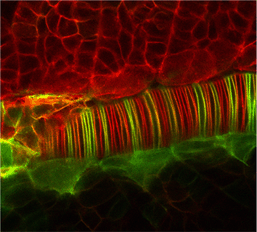Lab
Ciruna Lab
|

|
Statement of Research Interest
RESEARCH INTERESTS
-Molecular genetic regulation of embryonic development
-Cell polarity and morphogenesis
-Neurulation and neural tube closure defects
-Zebrafish models of development and disease
RESEARCH ACTIVITIES
We are interested in understanding the molecular and genetic mechanisms that regulate early development, with specific emphasis on the planar cell polarity (PCP) signalling pathway and its role in embryonic morphogenesis.
Correct polarity is essential for normal cellular function. The characteristic apical-basolateral polarity of epithelial cells, for example, is required for directional ion transport and deposition of the basal lamina. In addition, polarity may also exist across the plane of an epithelium or field of cells. In vertebrates, this planar cell polarity (or PCP) instructs polarized cell rearrangements and morphogenetic processes that structure and shape the developing embryo. At neurulation, defects in PCP signalling are thought to cause spina bifida and anencephaly - neural tube closure defects that affect one in every 1000 human births. PCP signalling has also been implicated in skin development, polarization of the inner ear sensory epithelium, cardiac development and cancer. However, little is known about how PCP signals ultimately regulate these important cellular and physiological processes.
We are using the zebrafish as a model organism to investigate the fundamental mechanisms by which cell polarity is established, maintained and interpreted in the course of vertebrate embryonic development. By combining powerful live microscopic imaging capabilities with the genetic and embryological techniques afforded by zebrafish research, we are examining the dynamic regulation of PCP signalling at a sub-cellular level. Furthermore, we are employing forward genetic and candidate gene approaches to screen for novel regulators and modifiers of PCP signalling. We hope to gain insight into how regulation of cell polarity functions in normal development, and how aberrations in PCP signalling contribute to congenital malformations and disease.
-Molecular genetic regulation of embryonic development
-Cell polarity and morphogenesis
-Neurulation and neural tube closure defects
-Zebrafish models of development and disease
RESEARCH ACTIVITIES
We are interested in understanding the molecular and genetic mechanisms that regulate early development, with specific emphasis on the planar cell polarity (PCP) signalling pathway and its role in embryonic morphogenesis.
Correct polarity is essential for normal cellular function. The characteristic apical-basolateral polarity of epithelial cells, for example, is required for directional ion transport and deposition of the basal lamina. In addition, polarity may also exist across the plane of an epithelium or field of cells. In vertebrates, this planar cell polarity (or PCP) instructs polarized cell rearrangements and morphogenetic processes that structure and shape the developing embryo. At neurulation, defects in PCP signalling are thought to cause spina bifida and anencephaly - neural tube closure defects that affect one in every 1000 human births. PCP signalling has also been implicated in skin development, polarization of the inner ear sensory epithelium, cardiac development and cancer. However, little is known about how PCP signals ultimately regulate these important cellular and physiological processes.
We are using the zebrafish as a model organism to investigate the fundamental mechanisms by which cell polarity is established, maintained and interpreted in the course of vertebrate embryonic development. By combining powerful live microscopic imaging capabilities with the genetic and embryological techniques afforded by zebrafish research, we are examining the dynamic regulation of PCP signalling at a sub-cellular level. Furthermore, we are employing forward genetic and candidate gene approaches to screen for novel regulators and modifiers of PCP signalling. We hope to gain insight into how regulation of cell polarity functions in normal development, and how aberrations in PCP signalling contribute to congenital malformations and disease.
Lab Members
| Drinjakovic, Jovana Post-Doc | Borovina, Antonia Graduate Student | Hayes, Madeline Graduate Student |
| Superina, Simone Graduate Student | Ciruna, Leslie Research Staff | Gelinas, Danielle Research Staff |
| Hutchinson, Sarah Research Staff | Morley, Angela Research Staff |
